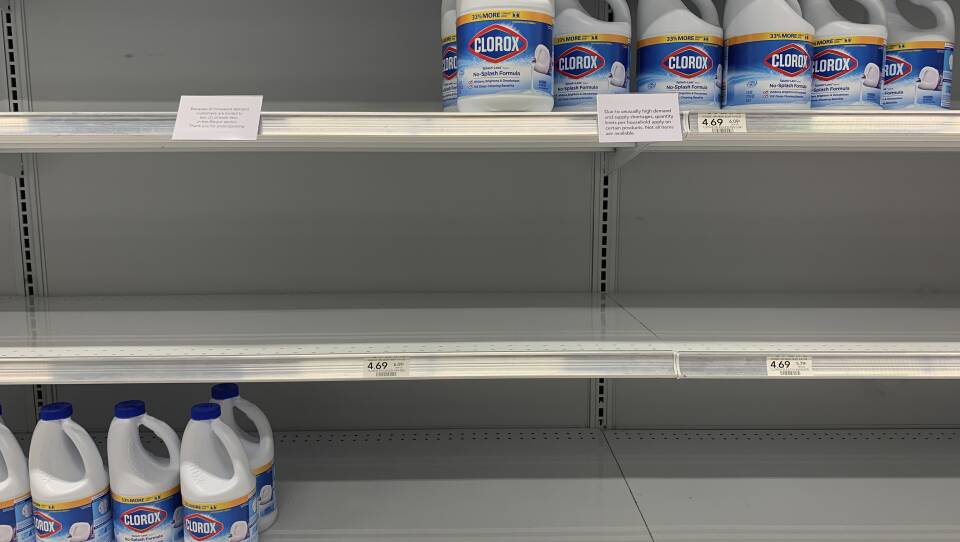How do you get ready for something when you don't exactly know what it is? That's been the recent scenario in many communities, as people learn more about the new coronavirus and try to prepare for a potential quarantine at home.
In the last few weeks in western Massachusetts, like elsewhere, shoppers have packed the groceries and big box stores, stocking up on canned goods, frozen entrees, toilet paper and hand sanitizer — if you can find any.
Among the shopping crowd were Lily Ruderman and Joshua Garcia. They live in Holyoke, Massachusetts.
"I’m doing it to appease my mother," Ruderman said, laughing, "because she’s stocking up! And I hope she doesn't mind me saying that!"
But she and Garcia also want to have everything they need.
"We follow the [coronavirus] stats pretty well," Garcia said. "The information is worrisome, but it's not scaring us too badly,” adding that they’re young and in generally good health.
In their shopping basket: rice, other nonperishables and things for the freezer.
Thinking about your pantry is a good place to start when preparing for an emergency, according to Kathy Harrison, author of "Just in Case: How to Be Self-Sufficient When the Unexpected Happens."
"Then, add toiletries,” Harrison said. “Sanitation [products], the things that we have all the time that would be really hard to do without.”
About a decade ago, when Harrison first wrote about preparedness, she was raising small children, including foster kids, in rural Cummington. The town had many power outages. In an ice storm, she said they needed a chainsaw and a tractor to get down the road to a doctor.
Harrison wondered, could she provide hydration for a sick kid at home? Yes — if she were prepared.
Stocking up is not an option for everyone, namely people with a low or no income. Federal food assistance or SNAP benefits are wide reaching, but they're limited.
“The notion that folks have extra space in their budget to fill the shelves in case of a bad storm or a quarantine is just not something that people in poverty experience,” said Stacy Dean, vice president for food assistance policy at the Center on Budget and Policy Priorities in Washington, D.C.
The federal government has guidelines for issuing additional food aid during a disaster, and this week some members of Congress proposed temporarily increasing those benefits.
And benefits arrive on a calendar, once a month. What if the storm or the pandemic hits at the wrong time?
"You may not have anything available to purchase food," Dean said. “You may be in that last week where you're counting on food banks or stretching meals to get through a week."
In anticipation of a local outbreak, food banks are also changing up their sanitation practices and planning ahead.
But Lev Ben-Ezra, executive director of the Amherst Survival Center, said many people are already navigating food insecurity.
"We have folks who are farmers, we have folks who are working multiple jobs, we have parents, we have senior citizens, we have folks who are currently experiencing homelessness," Ben-Ezra said.
Emergencies place a disproportionate impact on people with the least resources, Ben-Ezra said. The center's basic readiness plan for now is to deliver food to people if needed, even bring it out to the parking lot. But the situation is changing daily.
"So, can we really be prepared?" Ben-Ezra said. "Can we know exactly what action steps are going to be needed three days from now, a week from now, six weeks from now? No. Can we be prepared in the sense that we know what resources we can pull from, that we're thinking about these things? Yes."
The center gets a lot of its fresh and nonperishable food from the Food Bank of Western Massachusetts, which serves about 90,000 individuals a month in the region’s pantries and shelters. In an email, the nonprofit said that in preparation for the pandemic, they're working with the Federal Emergency Management Agency and national volunteer organizations who are experienced in helping out in other kinds of disasters.
Harrison suggested that if you're out there shopping, and have some room in your budget, do what she's doing: Buy extra groceries for others, or throw a package of diapers in your cart.
“And then... I can drop those diapers off at a food pantry, because they're $18 a box,” Harrison said, “and that's $18 [a] family has to spend on spaghetti sauce and pasta, parmigiana cheese and some powdered milk.”
Getting ready for the coronavirus is about more than stocking up, Harrison said. Whether you live in an apartment building or a house, your community may get smaller for a time. She recommends getting to know your neighbors.




